- Home
- Sarah Hall
Burntcoat Page 2
Burntcoat Read online
Page 2
Her individual character, Shun. You know what I mean.
No.
Her nature, her Naomi-ness!
I was a young art graduate, trying to test myself and develop a practice. I was lost in this strange, quiet, dissimilar place – gaijin, a bizarre person from the outside. Shun lifted a hand towards the forest, where the cedars stood in green-lit ranks.
She is your mother. She cannot lose her nature if she is not separate.
It had seemed, then, such a beautiful denial of concept.
Walking to the market this morning I felt the first flurries of panic. The stalls stand close together, rows of fruit and fish and belts, and I had to squeeze past pedestrians in the narrows. The country, and most of the world, has been vaccinated so I can share public air, interact; it’s no longer an offence. I had on a common white Health Service-issued mask, and might simply have seemed to be suffering a cold. I often cover my hands, if I’m working or wheeling the truck through the city. But I was wearing silicon medical gloves that I’d taped at the wrists.
It was warm; people were sleeveless, enjoying the first proper sun. This city is small; the inhabitants know each other. The cafe owners, taxi drivers, Sam directing traffic by the castle junction, and Ginny who sells amalgamated soaps and sleeps rough in the park. The vendors are used to seeing me dressed in overalls, hauling the truck along the street, sometimes with Peltors on my ears if the noise is bad, or wearing my purple-tinted glasses. They think I’m a shabby millionaire, half of which is true. I must have looked even more the misfit with wrapped blue hands. Or what I am: infectious, paranoid.
Rostam noticed immediately. His eyes curtseyed down and then up to my face. Perhaps I imagined his quick sift of recollection, the recoil, then compensation. Some people remember; others choose not to. Accommodation has taken us a long time.
Madam, he announced. It’s a great pleasure to see you today. I have a new shipment from Damascus. Very delicate flavour. My friends in the collective gave me a special price. I can offer it to you.
Rostam is our street king, master of the bazaar in leather and a trilby. I remember when he took over the stall, a heavy-browed young man, possessed by theatrical humility and the confidence of desperation. He knew you too, by way of other immigrants, the community network of cousins. We don’t speak of you; the past is simply in us. I’m an intermittent customer to his stall. I have no use for modified tulips or palm gardens though I like the rose leaf he imports, but he treats me as if I’m royalty, someone who spends great fortunes on his bouquets.
No, I don’t need tea.
I was more reticent than usual. I tried to hide my hands, explained that I wanted the blossom – the tree should already be flowering if possible, or would flower within a week. That timescale. Not later than ten days. If he could not help I would go elsewhere, I said, though I knew he would, that he trades widely beyond the market. I explained it all too urgently, perhaps, and his face fell. He reached for my awkward plastic hands and held them, warmly through the gloves. It took some willpower not to withdraw and leave. There was clattering and shouting in the market, but a familiar sound was beginning, high-and low-pitched, rhythmic. Like electrical waves, hissing along their fetch, surging and breaking. I know better than to think others hear it too, though it seems to come from their mouths, between buildings, any sonic atom.
I understand. I will get it for you.
Rostam spoke quietly, the tradesman’s bluff dispensed with.
You must promise not to go anywhere else. It is my responsibility. Yes?
Yes, thank you.
He squeezed and released my hands. The kindness moved me. I knew he would not speak overtly, that I’d be spared pity. He’s a man who understands masks, what they won’t admit, what they reveal by their deception. I walked away, pressing my fingers on my ears, and stood for a while under the chestnut tree by the bicycle rank, where the broad leaves absorb the city’s energy, the assaulting noise. I looked towards the cafe, which is painted dark blue now and has an iron bench outside that pigeons shuffle and sit along.
I’ve been inside a few times – the coffee is good, affordable, free of chicory. It’s been several different establishments since you owned it – a vegan deli, a sewing shop. For a while it was a ramen bar. I sometimes sat in the window holding my bowl, thinking about Shun’s wife, Umeko, how she would politely correct my technique, as if I were a child. The yolks of the eggs on her exquisite dishes like the orange eyes in the centre of the cedar trunks. It used to be a tiny place, with room for only seven tables, but they’ve opened up the second and third floors. Even with different coats, even repurposed, the memories remain.
Which name shall I call you?
The first. Halit.
Above the window was a sign – For Sale. And by the entrance a soft warping to the air as if steam was venting from inside. I turned and walked home a different way.
It was January when I first went to the cafe. The name was painted on the architrave. Biraz. The place didn’t seem to know what it was – there were shelves of books by the bar, plants too big for the seating area, textiles mounted on the wall, embroidered pomegranates, enamelware. There was a photograph by the till, a man in a fifties hat, crescent-eyed and gaunt, sitting with his dog on a boat. In tiny ceramic vases, stems of rosemary and lemon balm. People were drinking – coffee, wine, rakı. At one table a game of backgammon was being played. There was only one member of serving staff, a young woman who seemed overwhelmed. And behind the kitchen curtain – you.
My friends – Kendra and Bee – had heard the food was excellent and were disagreeing about what kind of cuisine it was. North African, Middle Eastern, fusion. There was no menu; a series of dishes circulated and were chosen or declined. It was a rare evening out – I’d become reclusive and overworked, Kendra had a baby.
She’d forced me away from the studio, told me to wash and tidy myself, and had left the baby with her mother-in-law, determined to eat something she hadn’t cooked herself.
This is what passes for glamour, she’d said when I opened the door and she saw my flannel shirt. At least undo that top button, love. Let’s go before I start leaking.
My hair had grown to a reasonable length, everything had calmed after the recent, wild success, and the loss of myself. My bones had sunk back into my flesh.
Do we have to do this, I’d asked.
It was cold outside. The air was stiff and had the gunpowder-and-salt smell of winter; the month already seemed dead. I’d been working in gloves and a hat in the freezing studio.
Haven’t you heard there are terrible things going on? Wars, mega-bugs, Nick’s mother. Live while you can.
Kendra ratched around in her bag, found a lipstick and held it out.
Here. Kahlo Red.
We’d drunk most of a bottle of wine when the first dish arrived. The waitress had disappeared. You walked from the kitchen towards our table, holding a bowl so delicately in your hand it might have been a nest. The hazelnuts had somehow been surrounded by spiced sugar; each was floating inside a glass case. You placed the bowl in the centre of the table, and then, though it was not out of position, you adjusted the knife at my place setting. There was a lithe grace to the way you moved, like a muscled, upright cat. The blue of your eyes glinted, seemed deposited, as if there was a greater mass of colour behind. I stared at you through your series of questions. Was the wine acceptable? Were we comfortable? Did anyone not like octopus?
I adore octopus, Bee said, though she hated seafood.
I don’t believe in inevitability. I didn’t really believe in anything, other than my work. It’s not that I knew you, or didn’t. I just couldn’t stop looking. The astonishing speed of desire. Construction of bones. Volumes of the body. Scent. This is how it begins, with physical intuition. You were talking to my friends, casually, answering Kendra’s questions, and seeing, mostly, me. Yes, this was your restaurant. Yes, you knew The Anchorman, which was owned by her husband. No, you were not Fre
nch, your accent was often mistaken. I noticed Bee staring too, with less intention. She was married, as good as. I was the solitary one, had exited a series of relationships I couldn’t ignite or sustain, had declared, fatally at thirty-two, that I could only commit to art. You smiled, at our group, at me, then excused yourself and returned to the kitchen. The curtain swung closed.
Finally the blood’s started moving south!
I turned back to the table and Kendra was smirking at me.
I drank too much, enough to get free of myself, flirted with the men playing backgammon. You smiled every time you entered the dining area; then, because I’m no gamer, the conveyance became something else. Precognition. Promise. We were travelling through what would happen, the wet map of intimacy, the abandonment.
Was the dinner OK, you asked as I was paying. How was everything for you this evening?
The others had gone, purposefully, insisting I act. The restaurant was empty, the boards and counters put away, the waitress had vanished. There was a flaw in one of your irises, silver-grey, like the broken tip of a knife.
I liked the dish with the mulberries.
The tabbouleh?
Yes.
Thank you. I’m glad you liked it.
You took the cash, gave me the receipt. I had a resin mark on the sleeve of my shirt, reddish, like a wine spot.
Bak, you said, taking hold of the cotton cuff.
You reached for a napkin, tried to blot the mark. Your hair was tied back under the chef’s bandana, your dark beard was cut close, framing your mouth.
It won’t come off, I said. It’s pine tar.
You hadn’t touched my skin at all, though one finger was underneath the cuff – the courtesy was exquisite. My arm fell slowly as you released it. Perhaps I still smelled of smoke and sap, though I’d been in the bath. I knew what I was. I felt myself rise, as if from the undergrowth, like a creature standing stark against the landscape.
Would you like a drink? I asked. With me.
The smile faded, your eyes uncreased at the corners and lost their glimmer, and the congenial host disappeared.
Now? Ah. It will take me forty minutes to finish, maybe one hour. I need to clean the kitchen and get changed. It will be very late.
I wasn’t sure if you’d said no, so I stood stupidly, saying nothing, a dull feeling spreading through my chest. You seemed caught between problems, and suddenly I was aware there were rules, a finesse to exchanges that I didn’t possess. My candour was a breach. You calculated something, nodded.
I can meet you. Please choose where we should go.
Near the river was a bar that served late coffee and cocktails. I found a table in the corner, played with the soft wax of the candle, wondering what fantasy I’d created and then ransacked. In the bathroom mirror I looked at myself, put water in my hair, opened a button on my shirt. On the end of its chain was the gold peacock feather, one of the few items of jewellery I owned. You arrived quicker than you’d said you would, and looked different out of the white jacket, dressed in jeans and a faded shirt. Your hair was long, to the collar. You’d put on deodorant, but there was still the smell of cooking, fryer oil and garlic. Some spell was gone, replaced not by disappointment but unpreparedness. You kissed both my cheeks. When you spoke, you seemed less fluent – nerves, perhaps. I didn’t know whether to apologise for my approach. In the restaurant I’d seen and almost felt the sex, the skin’s heat and sheen, and slick of viscous white. In the bar we were stripped back, had to begin as children making friends in a deliberate way, looking for something to share.
Where are you from?
I’m a mix. I moved countries. My English teacher was Scottish. I’ve actually been here ten years. I’m sorry – I didn’t ask your name.
It’s Edith.
Edith. That’s nice.
You introduced yourself, formally, succinctly gave the reasons for dual citizenship, your family’s expulsion during childhood. The explanation seemed rote, as if it had been given many times.
I’m called after my grandfather.
What’s your other name – the Christian one?
Konstadin Konstadinov. He’s the one who is officially here on the documents.
I told you I’d changed my name too. You seemed pleased and did not ask why.
What is pine tar?
It’s a preservative. I use it sometimes for waterproofing wood.
Are you a carpenter?
Sort of. I make things – usually for outside. They’re quite big.
I’m not really a chef. I studied chemistry.
We talked about the city, music, past lives, in which the first stories of hardship and unbelonging were revealed. Somehow, though we lived within a mile of each other, we had never met. The drinks crashed inside the barman’s tumbler; they were strong, clarifying. The bottles on the shelf were unrecognisable, turquoise, red, like an apothecary’s. We were the only ones there, and our solitude seemed important. The world was suspended. When the bar shut we walked along the icing river, our breath like smoke.
The date was oddly innocent. It was not until we said goodbye on the towpath and kissed that the truth of what I’d imagined was exposed. Your mouth was soft inside the sharp beard, tasted of anise. The moist flare of your tongue was an accelerant. I found myself pulling your hips close. You pressed me against the cold, iron-belted wall and continued as two drunks walked past, our state more stupid than theirs. It was as if the air had become suddenly toxic. When we pulled apart it felt like drowning. We could only breathe with our mouths held together.
Burntcoat stands at the edge of the old industrial part of the city, where the riverbank links workers’ cottages, trade buildings and docks. Friends with houses in the Victorian wards thought I was mad to want to live here, until I explained how much space I needed. The building’s records are incomplete so I don’t know what its primary purpose was. Storage, auction, an exchange for cattle and cargo brought upstream from the estuary, or perhaps it was used to mend masts. It was half-ruined when I bought it, full of pigeon shit, cans and condoms. Almost two centuries of disrepair and illicit use had left it scarred, historically unlisted and cheap. The name is inexplicable in the deeds – some eponymous merchant’s, an incendiary event. I admit, the name made me want the building, as well as the proportions. Such things shouldn’t be meaningful, but they are. Even renovated, Burntcoat is ugly by most standards, a utilitarian warehouse, but it stands beside the river’s lambency – a hag in a bright mirror. Sometimes people pause on the road outside, trying to read the writing on the bricks.
This section of river is slow and opaque, with acidic willows above the metal sidings, chained entry points and steps that disappear down into the water. Graffiti on the bridges. Skeins of debris and oil on the surface. The old wooden boathouses have been demolished or have buckled with rot, the mills converted into chic flats now.
After art school and the collective, my early luck, I thought about moving back to the uplands, but it seemed nostalgic, the territory of the past. Naomi’s world; after her illness she’d abandoned herself in the wild. Instead, I settled at the region’s edge, where the landscape opens into sky, and there are people, trains to the capital, a different kind of absentia. I’ve come to love the middle-place, the derricks and drowned roots, hidden culverts, algae-stained boats and the river’s chandlery.
In the year of Naomi’s rehabilitation, my parents’ relationship deteriorated rapidly. How happy they’d been before, what cracks there might have been, I can’t say. My father ran the local playhouse, Naomi was an author; they were prominent, artistic figures in the town. No doubt there were jealousies, scales of success – I’ve seen it frequently since, most dangerously when the women ascend. And also when they fall.
No one believed she would ever write again. When she was moved back to the beaconside house she still couldn’t function, mixing up words, breaking things, wetting herself. There were house fires, overflowing baths, fish tucked into sock drawers. It
was like absurd theatre.
Pass me that table I want to put it on. It looks onions outside.
Funny, I thought, and my laughter seemed to make Naomi feel better. My father grew impatient.
You’re not helping, Edith. She isn’t joking.
For him there was shame. Naomi had no sense of embarrassment, no longer cared about her appearance. Once she’d worn stylish hats, an embroidered Russian coat with a collar of feathers. She’d had an agent. Now she didn’t wash properly and picked her lips, made strange lowing noises if she was anxious.
She was visited by a speech therapist each week.
Click, cluck, clock. Sing, wrong, thing.
Give me a silly sentence and a sensible sentence, Naomi.
Put your tongue out. Wide mouth. Kiss shape.
For a while we were reading at the same level, and we would sit together, sharing my comics and adventure stories. She was like a big, disabled sister. I tried to help, learnt how to make tea, brushed my own hair, put the laundry on. Little things she’d done that I knew would annoy my father I claimed as my mistake or cleaned up. The egg cracked open on top of the television.
I could feel his resentment mounting. There were other frustrations. Where her emotions had been, imperviousness now existed. She had no recollection of ever loving him. I could hear arguments in other rooms.

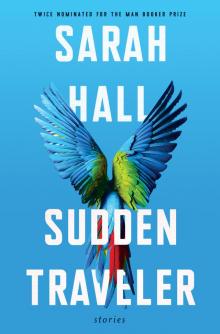 Sudden Traveler
Sudden Traveler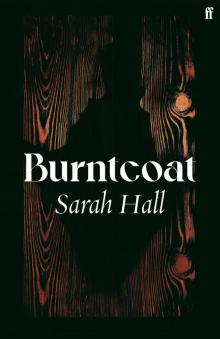 Burntcoat
Burntcoat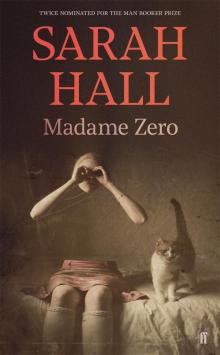 Madame Zero
Madame Zero Mrs Fox
Mrs Fox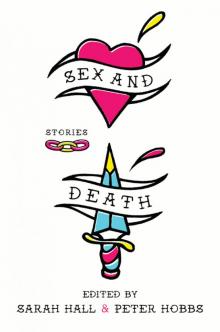 Sex and Death
Sex and Death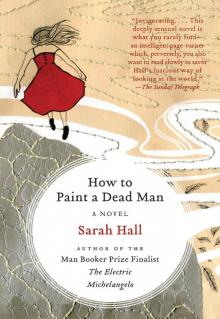 How to Paint a Dead Man
How to Paint a Dead Man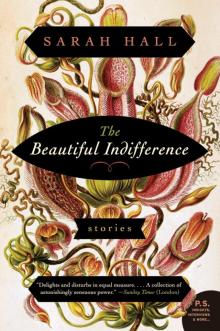 The Beautiful Indifference
The Beautiful Indifference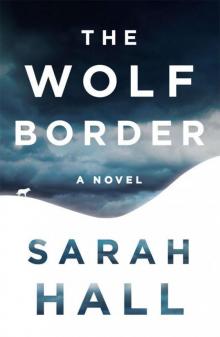 The Wolf Border
The Wolf Border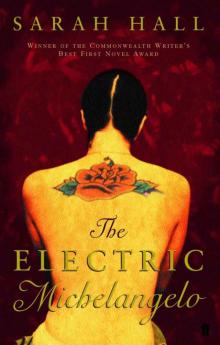 The Electric Michelangelo
The Electric Michelangelo